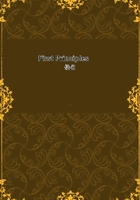
第101章
Recapitulation, Criticism, and Recommencement §89. Let us pause awhile to consider how far the contents of theforegoing chapters go towards forming a body of knowledge answering to thedefinition of Philosophy.
In respect of its generality, the proposition enunciated and exemplifiedin each chapter is of the required kind -- is a proposition transcendingthose class-limits which Science, as currently understood, recognizes. "TheIndestructibility of Matter" is a truth not belonging to mechanics morethan to chemistry -- a truth assumed alike by molecular physics and the physicsthat deals with sensible masses -- a truth which the astronomer and the biologistequally take for granted. Not merely do those divisions of Science whichdeal with the movements of celestial and terrestrial bodies postulate "TheContinuity of Motion," but it is no less postulated in the physicist'sinvestigations into the phenomena of light and heat, and is tacitly if notavowedly, implied in the generalizations of the higher sciences. So, too,"The Persistence of Force," involved in each of the preceding propositions,is co-extensive with them, as is also its corollary, "The Persistenceof Relations among Forces." These are not highly general truths; theyare universal truths. Passing to the deductions drawn from them, we see thesame thing. That force is transformable, and that between its correlatesthere exist quantitative equivalences, are ultimate facts not to be classedwith those of mechanics, or thermology, or electricity, or magnetism; butthey are frustrated throughout phenomena of every order. Similarly, the lawthat motion follows the line of least resistance or the line of greatesttraction or the resultant of the two, we found to be an all-pervading law;conformed to alike by each planet in its orbit, and by, the moving matters,aerial, liquid, and solid, on its surface-conformed to no less by every organicmovement and process than by every inorganic movement and process. And so,likewise, it has been shown that rhythm is exhibited universally, from theslow gyrations of double stars down to the inconceivably rapid oscillationsof molecules -- from such terrestrial changes as those of recurrent glacialepochs down to those of the winds and tides and waves; and is no less conspicuousin the functions of living organisms, from pulsations of the heart up toparoxysms of the emotions.
These truths have the character which constitutes them parts of Philosophy.
They are truths which unify concrete phenomena belonging to all divisionsof Nature; and so must be components of that all-embracing conception ofthings which Philosophy seeks. §90. But now what parts do these truths play in forming such a conception?
Does any one of them singly convey an idea of the Cosmos: meaning by thatword the totality of the manifestations of the Unknowable? Do all of themtaken in succession yield us an adequate idea of this kind? Do they evenwhen thought of in combination compose anything like such an idea? To eachof these questions the answer must be -- No.
Neither these truths nor any other such truths, separately or jointly,constitute that integrated knowledge in which Philosophy finds its goal.
It has been supposed by one thinker that when Science has reduced all morecomplex laws to some most simple law, as of molecular action, knowledge willhave reached its limit. Another authority holds that all minor facts areso merged in the major fact that the force everywhere in action is nowherelost, that to express this is to express "the constitution of the universe."But either conclusion implies a misapprehension of the problem.
For these are all analytical truths, and no analytical truth, nor anynumber of analytical truths, will make up that synthesis of thought whichalone can be an interpretation of the synthesis of things. The decompositionof phenomena into their elements is but a separation for understanding phenomenain their state of composition, as actually manifested. To have ascertainedthe laws of the factors is not to have ascertained the laws of their co-operation.